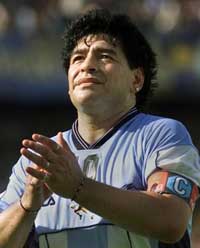Clinic director: Tests on Maradona 'favorable' so far
Initial medical tests on Diego Maradona, who is being treated at a private clinic for alcoholism and excessive eating, were all "favorable" and the Argentine soccer hero remained in stable condition, doctors said.

The 47-year-old former star spent Thursday under sedation to avoid problems with withdrawal from alcohol, said Hector Pezzella, director of the Guemes Sanatorium. Maradona was brought to the Buenos Aires clinic in an ambulance the day before.
Pezzella said Maradona's life was not in danger and that he was in stable condition and improving.
"Alcoholism in Mr. Maradona or in any other patient is not something to be taken lightly. One has to treat it," he declared at the door of the clinic. "They are undertaking treatment specifically for addiction."
Later Thursday, Pezzella told a news conference that several routine tests had been conducted and "all the results are favorable."
"There is a very good evolution" under way, Pezzella said, adding no "pathology" or underlying disease condition was detected.
Maradona led Argentina to the 1986 World Cup title and the final in 1990. In 2001, FIFA declared him one of the greatest players in soccer history, alongside Pele.
But off the field, he has battled cocaine addiction and obesity. In March 2005, Maradona underwent gastric bypass surgery in Colombia, sharply reducing his weight.
A psychiatrist, Carlos Nasef, who spoke alongside Pezzella on Thursday evening, said a team of mental health specialists had been called by relatives to assist Maradona during his "detoxification."
"He is sedated and is cooperating" with doctors on his treatment, Nasef said.
Maradona's physician, Alfredo Cahe, said the soccer great - despite his own protests - was taken to the clinic late Wednesday for health problems brought on by overeating, drinking and "the quantity of cigars he smoked."
Cahe said Maradona's health problems did not involve cocaine or other dangerous drugs, adding Maradona had been in low spirits because of family and other problems.
"It was necessary to hospitalize him," Cahe said, adding he would remain at least one week.
Fighting for his life, Maradona was hospitalized in Uruguay in 2000 and again in 2004 in Buenos Aires. Maradona was counseled for drug abuse in Argentina in 2004 and in September of that year traveled to Cuba for treatment at Havana's Center for Mental Health.
In Bogota, the Colombian doctor who performed the gastric bypass in 2005 said Maradona's refusal to return for regular checkups for the complex stomach operation may have contributed to his latest woes.
After surgery in Cartagena, Colombia, to trim as much as 50 kilograms (110 pounds) from a ballooning waistline, Maradona never again contacted his Colombian doctors, Francisco Holguin, head of the Medihelp Service clinic, told Caracol Radio.
"Any patient who undergoes this sort of procedure needs to submit to regular checkups to make sure they're following recovery instructions, but in Maradona's case there was no follow-up," Holguin said.
Without contact, it was impossible for doctors to monitor whether Maradona was abiding by strict orders to exercise and maintain a low-calorie diet needed for the procedure to have lasting success, Holguin added.
Because of the operation, the 1.68-meter (5-foot-6) Argentine was able to cut by almost half the 121 kilograms (266 pounds) he weighed before coming to Colombia. But in recent months, his stomach had begun to bulge again as he was spotted frequenting Buenos Aires restaurants and nightclubs.
Maradona led Argentina to the 1990 World Cup final and won Italian and Argentine league titles. But in 1991, he failed a drug test and was banned for 15 months, and failed another drug test at the 1994 World Cup finals in the United States. He retired in 1997.
Subscribe to Pravda.Ru Telegram channel, Facebook, RSS!


